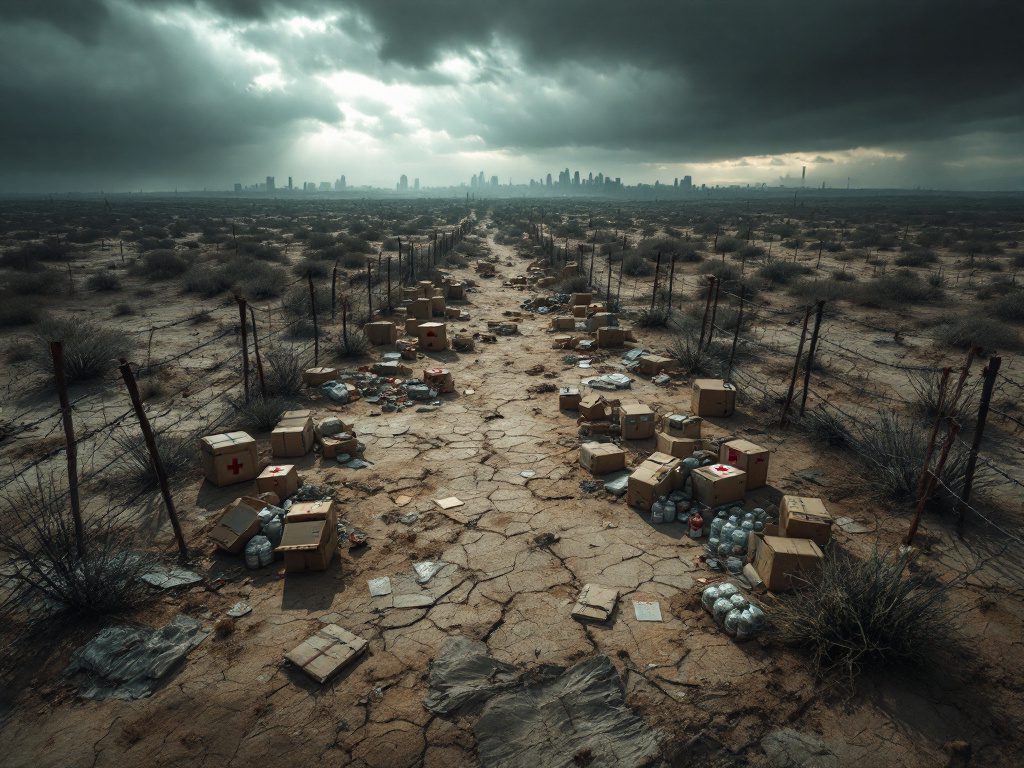Starved of Aid: Gaza’s Humanitarian Crisis
In the shadow of international headlines and amid ongoing conflict, more than two million residents of Gaza find themselves languishing without basic necessities, their plight deepened by a blockade that chokes off life-saving aid. Since March 2, Israel has sealed the main crossings into Gaza, halting nearly all deliveries of food, medical supplies, and fuel—despite a drumbeat of global warnings about looming famine and disease.
Harvard public health expert Dr. Leila Hassan warns that the situation is deteriorating rapidly: “Every day without humanitarian access compounds suffering and death. We’re witnessing a preventable disaster unfold in real time.” Reports from agencies like the World Food Programme and Médecins Sans Frontières paint a harrowing picture—children wasting away, hospitals running out of antibiotics, and entire neighborhoods left to scavenge for flour.
This emergency has drawn public rebuke from the United Nations’ Under-Secretary-General for Humanitarian Affairs, Tom Fletcher, who addressed Israeli authorities directly: “As the occupying power, Israel must allow the flow of humanitarian support. Aid should never be a bargaining chip. Blocking aid starves civilians.” Fletcher’s appeal, notably, acknowledged the pain on all sides, stressing: “Yes, the hostages must be released, now. They should never have been taken from their families. But international law is unequivocal.”
International Law, Political Pressure, and the Role of UNRWA
Across the global stage, intense debate surrounds Israel’s legal and moral obligations as Gaza’s occupying power. Most experts in humanitarian law agree that Israel has a clear duty under the Fourth Geneva Convention to provide for the needs of the population under its control. Yet, conversations at the International Court of Justice this spring spotlighted the deep fractures dividing international actors, especially regarding the fate of the United Nations Relief and Works Agency for Palestine Refugees (UNRWA).
The Israeli government, with strong support from the United States, has banned UNRWA’s operations in Gaza, alleging that some of its employees participated in the October 7 Hamas attack. The U.S. State Department, echoing Israeli claims, argued at the ICJ that occupation law “does not compel an occupational power to allow and facilitate relief operations” by any specific organization, even when the relief itself is impartial. Several donor nations—including the U.S.—suspended financing to UNRWA pending an investigation.
Yet, an independent panel commissioned by the United Nations found Israel’s evidence “insufficient” to demonstrate systemic collusion between UNRWA and Hamas, as cited in a report released in April. This hasn’t stopped Israel’s Knesset from formally banning the agency’s return. UNRWA, often the last lifeline for Palestinian civilians, is now sidelined in Gaza, and multiple other agencies report facing increasingly insurmountable hurdles as their workers are denied access, sometimes under fire.
“Restricting aid is starving civilians, depriving them of essential medical care, stripping them of hope, and inflicting severe collective punishment.”
— UN Under-Secretary-General Tom Fletcher
Dissenting voices are growing louder. Omani UN Ambassador Omar bin Saif Al-Kharousi declared the blockade and destruction of hospitals, schools, and shelters as “crimes against humanity,” warning the Security Council of “the grave consequences of international complacency.” The recurring use of starvation and forced displacement as weapons of war—long condemned since the Geneva Conventions emerged from World War II’s atrocities—now resurfaces in Gaza, with the world watching in real time.
The Moral Reckoning: Scrutiny, Accountability, and Progressive Advocacy
How did a humanitarian crisis of this magnitude become entangled in the deadlock of geopolitics and bureaucratic logic? Beyond political fault lines, the suffering in Gaza transcends legal debate. A closer look reveals a landscape where accountability is demanded selectively, and international law’s clarity is too often dulled by expediency.
According to the Norwegian Refugee Council, more than 90% of Gaza’s population now faces food insecurity. Epidemiologists warn of impending disease outbreaks—dysentery, cholera, measles—threatening a generation already traumatized by violence. The Israeli army’s renewed assault in March, which shattered a fragile ceasefire and triggered fresh waves of displacement, further complicated the delivery of basic supplies, even as over 52,000 Palestinians have reportedly been killed since October 2023.
Why, then, does the world permit one of the most basic tenets of human decency—the right to food, shelter, and medicine—to be reduced to a transactional tool? Calls for an immediate and unconditional lifting of the blockade are echoed not only by the UN but also by humanitarian organizations worldwide. Not one progressive value—equality, social justice, or basic compassion—can be squared with a policy that deliberately condemns millions to deprivation.
The blockade’s real-life consequences shatter any abstraction: families forced to watch children starve, parents unable to procure insulin or antiseptics, young men and women robbed of hope. “We are being punished collectively for crimes we did not commit,” said a young Gazan nurse to reporters last week, her hospital without power or antibiotics for a month.
Harvard law professor Noah Feldman notes, “Collective punishment is illegal under international law, and the world’s unwillingness to enforce this standard in Gaza undermines not just Palestinian rights, but the legitimacy of the entire system of humanitarian protections forged in the 20th century.”
The time for selective outrage is past. If progressive advocacy stands for the most vulnerable, then silence—or tepid statements—by policymakers and allies only serves to normalize injustice. As witnessed in past global crises, real change begins when conscience outweighs convenience. The blockade of Gaza is not simply a matter for diplomats to haggle over; it’s a crisis demanding urgent, principled action from all who claim allegiance to human rights.

